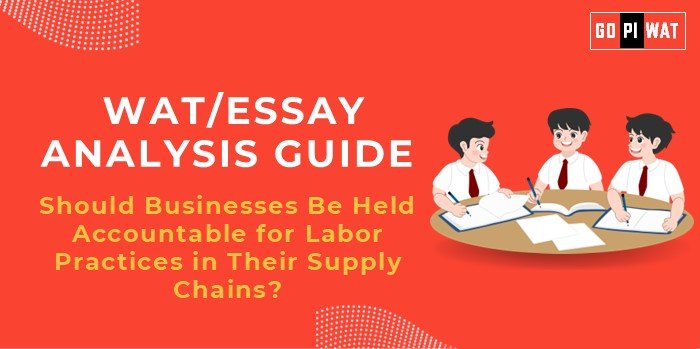📋 WAT/Essay Analysis Guide: Should Businesses Be Held Accountable for Labor Practices in Their Supply Chains?
🌐 Understanding the Topic’s Importance
The essay holds relevance as businesses are increasingly evaluated for their ethical responsibilities. Poor labor practices in supply chains can damage reputations, lead to consumer backlash, and affect profits.
📝 Effective Planning and Writing
- ⏳ Time Allocation: 5 min for planning, 20 min for writing, 5 min for review.
- 📖 Introduction: 60-70 words
- 📚 Body: 350-375 words
- 📄 Conclusion: 60-70 words
✨ Introduction Techniques for Essays
- 🔄 Contrast Approach: “While globalization enables businesses to source cheaply, it often comes at the cost of labor exploitation, especially in underdeveloped regions. Should businesses bear the responsibility for ensuring ethical practices in their supply chains?”
- 📖 Case Study Start: “The collapse of Rana Plaza in Bangladesh in 2013, killing over 1,000 garment workers, exposed the dark side of global supply chains. It raises a critical question: should businesses ensure ethical labor practices?”
📚 Structuring the Essay Body
🌟 Achievements:
- Global initiatives like the UN Global Compact and Fair Trade Certification demonstrate that businesses can align profit motives with ethical labor practices.
- Brands like Patagonia and Starbucks have shown that ensuring fair wages and safe working conditions enhances consumer trust.
⚠️ Challenges:
- Supply chains often span countries with weak labor laws.
- Competitive pricing pressures force businesses to reduce operational costs, sometimes at the expense of worker welfare.
- 📖 Example: Despite audits, violations still occur in China’s factories.
🌍 Future Outlook:
- Businesses can adopt emerging technologies like blockchain for supply chain transparency.
- Governments should introduce mandatory due diligence laws, as seen in the EU.
- A collaborative effort among stakeholders can ensure ethical and sustainable practices.
📄 Concluding Effectively
- ⚖️ Balanced Approach: “While businesses have a responsibility to ensure ethical labor practices, achieving sustainable change requires support from governments, NGOs, and consumers.”
- 🌐 Future-Focused: “The future of business lies in responsible supply chains where ethical labor practices are non-negotiable. Technology and global cooperation will be key to achieving this vision.”
🔑 Analyzing Successes and Shortcomings
🌟 Key Achievements:
- Ethical brands gaining global recognition.
- Adoption of technology to track supply chain labor practices.
⚠️ Ongoing Challenges:
- Weak enforcement of labor laws in developing countries.
- Costs associated with ethical compliance.
🌍 Global Context:
- EU Due Diligence Law: Mandatory requirements for ethical supply chains.
- Rana Plaza Tragedy: A global wake-up call for labor ethics.
🎯 Recommendations for Sustainable Progress
- 💻 Adoption of blockchain for real-time supply chain monitoring.
- 🔍 Mandatory global labor audits and compliance frameworks.
📝 Sample Short Essays
⚖️ Balanced Perspective:
“Businesses benefit from global supply chains but must ensure that labor practices are fair and humane. While competitive pressures pose challenges, ethical supply chains enhance brand reputation and ensure long-term sustainability. Governments and NGOs must collaborate with businesses to enforce compliance.”
💡 Solution-Oriented:
“Businesses should leverage technology like blockchain for transparent labor tracking. Global frameworks like the UN Global Compact provide a roadmap for ethical practices. Collaborative solutions between governments, businesses, and consumers can drive lasting change.”
🌍 Global Comparison:
“Countries like the EU enforce mandatory due diligence laws, ensuring accountability. Learning from incidents like Rana Plaza, businesses worldwide must adopt similar frameworks to ensure ethical supply chains, balancing profitability with social responsibility.”
📚 Additional Insights for B-School Students
- Ethical leadership in supply chains directly links to corporate governance.
- Innovations like blockchain provide real-world examples for operations management projects.


